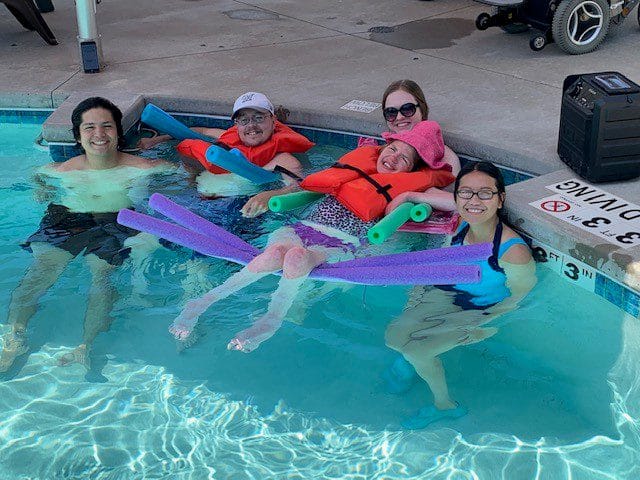

New nursing immersion program offers students meaningful, hands-on experience at respite camp
Katie Dowdy spent part of her UW–Madison Summer Term at summer camp. But it wasn’t all s’mores and swimming. As a student in a summer respite camp immersion, Dowdy played an important role at respite camp, providing services for people with a broad spectrum of disabilities and practicing new nursing skills.
“It was a really incredible experience,” said Dowdy, a senior nursing student who plans to graduate in the spring. “Being able to learn from people on the front lines as well as the campers themselves was just a great opportunity.”
Nursing 436: Summer Respite Camp Immersion for Undergraduate Nursing Students was created for Summer Term 2019 to address a nursing need. While 15 percent of the world’s population lives with some form of disability, nursing students have little exposure to people with disabilities.
Students in the six-week course did two weeks of online preparation, learning skills that they put into practice while working at camp for three weeks, and followed up with a one-week online wrap-up. Experienced camp nurse preceptors supervised the students.
“The summer respite immersion is a unique experience,” said Kim Whitmore, assistant professor in the School of Nursing and master of public health faculty in the School of Medicine and Public Health. She used a Summer Term igniter grant to develop the course. “Nursing students typically don’t get exposed to individuals with disabilities or respite care in their traditional nursing education. Plus, they are in a fun, relaxing camp setting, which makes it very special.”
Totally accessible
For three weeks this summer, Dowdy worked and lived at two different Easter Seals Wisconsin camps in the Wisconsin Dells—Camp Wawbeek and Respite Camp. Both camps are on the same large parcel of land and are fully accessible with sleeping cabins, a dining hall, nursing station and a recreation center. Dowdy arrived at camp on Sundays to help check in campers and left on Friday afternoons, taking Saturdays off at home.


“Each week was a different experience and there was a unique feel at camp,” she said. She worked with young children through older adults with varying needs. During her third week, she worked with With A Little Help, Inc., a group dedicated to expanding recreational opportunities for adults with muscular dystrophy and related neuromuscular diseases.
Dowdy met with campers and caregivers, reviewed paperwork, helped prepare and distribute medications and staffed the nursing station, where she saw everything from bee stings to situations that required a trip to the emergency room.
“Getting to know the campers and just having fun with them was really special,” she said. “Many of them were doing activities that they would not normally be able to do because of their disabilities.”
The camps were totally wheelchair accessible, including wheelchair zip lines. Campers could take tractor rides, swim in an accessible pool and take strolls on accessible trails. They did arts and crafts and took a trip to the downtown Dells for ice cream and shopping as well as the Kalahari water park.
“There were so many important moments for me at camp,” Dowdy said. She described the time when she got nervous at the nursing station when a camper came in with a bad injury. The camper encouraged her, saying, ‘I trust you.’ Another memorable time was when Dowdy helped a married couple—both in wheelchairs—navigate to hold hands and put their arms around each other.
“And I will never forget how people loved the pool,” she said. “One camper said, ‘This feels so amazing. I haven’t been in a pool in years.’ It was so meaningful.”
Helping people be well
Dowdy’s provided respite care before, but it was in chunks of two to 12 hours. At camp, it was her first time doing 24-hour care. “After that first week, I felt like I needed to sleep for a week,” she said. “It really made me think about campers’ families and caregivers and the importance of respite care.”
The camp also taught her to pay more attention to accessibility—and advocate for it. “Even some of our hospital rooms are difficult to navigate in a wheelchair. When I see automatic doors, sinks and paper towel dispensers, those aren’t a big deal for me, but they’re really important things to consider when thinking about accessibility.”
Mostly, she learned from campers about handling unique needs and the many ingenious ways they manage their own care.
“The hope is that students in this course will develop a deep understanding of the complexities of caring for someone with a disability, but also understand the importance of maintaining quality of life and adapting the environment to ensure accessibility,” Whitmore added. “We also hope students develop an appreciation for the importance of respite care for family caregivers. For many, the week their loved ones are at camp is the only vacation they have all year.”
The course is currently only offered as a summer immersion experience, but Whitmore hopes to expand it and give students the opportunity to work at the camps on weekends during the school year or participate in a summer internship.
“When you are taking care of people in a hospital, it’s a very small view of their life,” she said. “When I got to see the campers going swimming, making friends, singing at the talent show, it made me realize that this is why I got into nursing in the first place—to help people enjoy their lives and be well.”
Find out more about the nursing immersion programs or other Summer Term opportunities.
Published on Sep 09 2019
Last Updated on May 16 2025
Categories: Student stories, Summer Term
Tags: courses, health & medicine, summer
